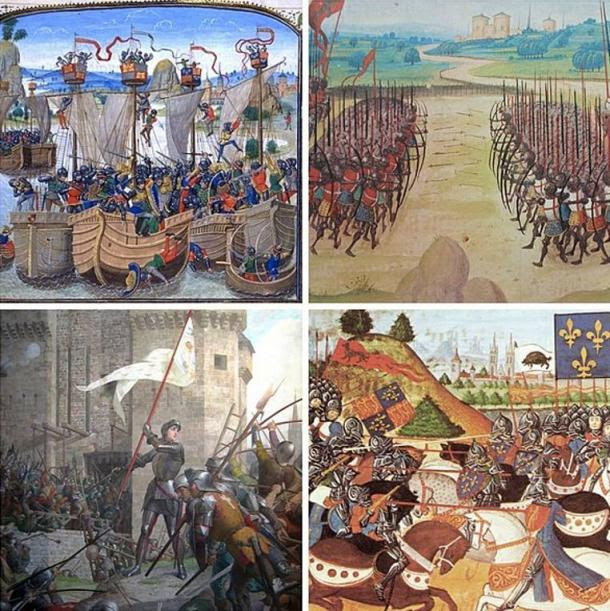A repost from 2020 (when Easter Monday also fell on April 13)
Black Monday (1360)
April 13–14, 1360
Black Monday: The Deadly 14th Century Hailstorm That Killed Over 1000 Soldiers and 6000 Horses

Can you imagine the headlines if something like that were to happen today?
And just so you know, I've been waiting for a couple years for Easter Monday to fall on April 13th.
The next occurrence will be in
Also at Ancient Origins:
Like Something Out of The Walking Dead: Medieval Warrior Found with Knife Hand Prosthesis

“It was not for nothing that my nose fell a-bleeding on Black Monday last, at six o’clock i’ the morning.”From Ancient Origins:
—William Shakespeare, ‘The Merchant of Venice’, ii. 5
Black Monday: The Deadly 14th Century Hailstorm That Killed Over 1000 Soldiers and 6000 Horses
On Easter Monday, 13 th April 1360, a freak hail storm broke over English troops as they were preparing for battle with the French during the Hundred Years’ War. So brutal was the storm that over 1,000 men and 6,000 horses lost their lives that night. Convinced it was a sign from God, King Edward rushed to pursue peace with the French, marking the end of the first phase of the Hundred Years’ War.
Inheritance Dispute Results in 116 Years of War
The Hundred Years’ War was a series of military conflicts between France and England which began in 1337 due to an inheritance dispute over the French throne, and only truly ended in 1453. The 116 years of the war saw the rise and fall of several kings and nobles.
During the course of the war, King Edward III of England was actively attempting to conquer France. In October 1359, he led an invading force of 10,000 men across the English Channel to France. The French avoided direct conflicts and remained sheltered behind protective walls, while Edward’s army sacked and burned the countryside.
On 5 th April 1360, Edward led his army to the gates of Paris, attempting to provoke the Dauphine of France (Charles V) into battle, but he refused. Unable to breach the Paris defences, Edward led his army onto the gates of Chartres, where they were again met with heavy fortifications.

Collage of paintings representing battles of the
Hundred Years' War.
Clockwise, from top left: La Rochelle, Agincourt, Patay, Orleans. ( CC by SA 4.0 )
Clockwise, from top left: La Rochelle, Agincourt, Patay, Orleans. ( CC by SA 4.0 )
The Storm Hits On Easter Monday April 13, the English army made camp outside Chartres in an open plain when a sudden storm materialized. The temperature dropped dramatically and thunder and lightning crashed overhead, striking and killing two of the English leaders. Panic set in among the soldiers, who had nowhere to run or seek shelter, and the horses stampeded. High winds and huge hailstones along with freezing rain began pelting down. Within half-an-hour, more than 1,000 men and 6,000 horses lay dead....MUCH MOREI had never seen the story until re-reading (missed it first time) Barbara Tuchman's "A Distant Mirror: The Calamitous 14th Century"
Can you imagine the headlines if something like that were to happen today?
And just so you know, I've been waiting for a couple years for Easter Monday to fall on April 13th.
The next occurrence will be in
Also at Ancient Origins:
Like Something Out of The Walking Dead: Medieval Warrior Found with Knife Hand Prosthesis
